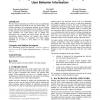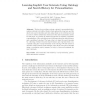499 search results - page 10 / 100 » Search Engines that Learn from Implicit Feedback |
SIGIR
2006
ACM
15 years 5 months ago
2006
ACM
We show that incorporating user behavior data can significantly improve ordering of top results in real web search setting. We examine alternatives for incorporating feedback into...
JUCS
2008
14 years 10 months ago
2008
: Search engines--"web dragons"--are the portals through which we access society's treasure trove of information. They do not publish the algorithms they use to sort...
KDD
2007
ACM
15 years 11 months ago
2007
ACM
In many data mining applications, online labeling feedback is only available for examples which were predicted to belong to the positive class. Such applications include spam filt...
CIKM
2008
Springer
15 years 1 months ago
2008
Springer
Learning-to-rank algorithms, which can automatically adapt ranking functions in web search, require a large volume of training data. A traditional way of generating training examp...
WISE
2007
Springer
15 years 5 months ago
2007
Springer
Abstract. The key for providing a robust context for personalized information retrieval is to build a library which gathers the long term and the short term user’s interests and ...


